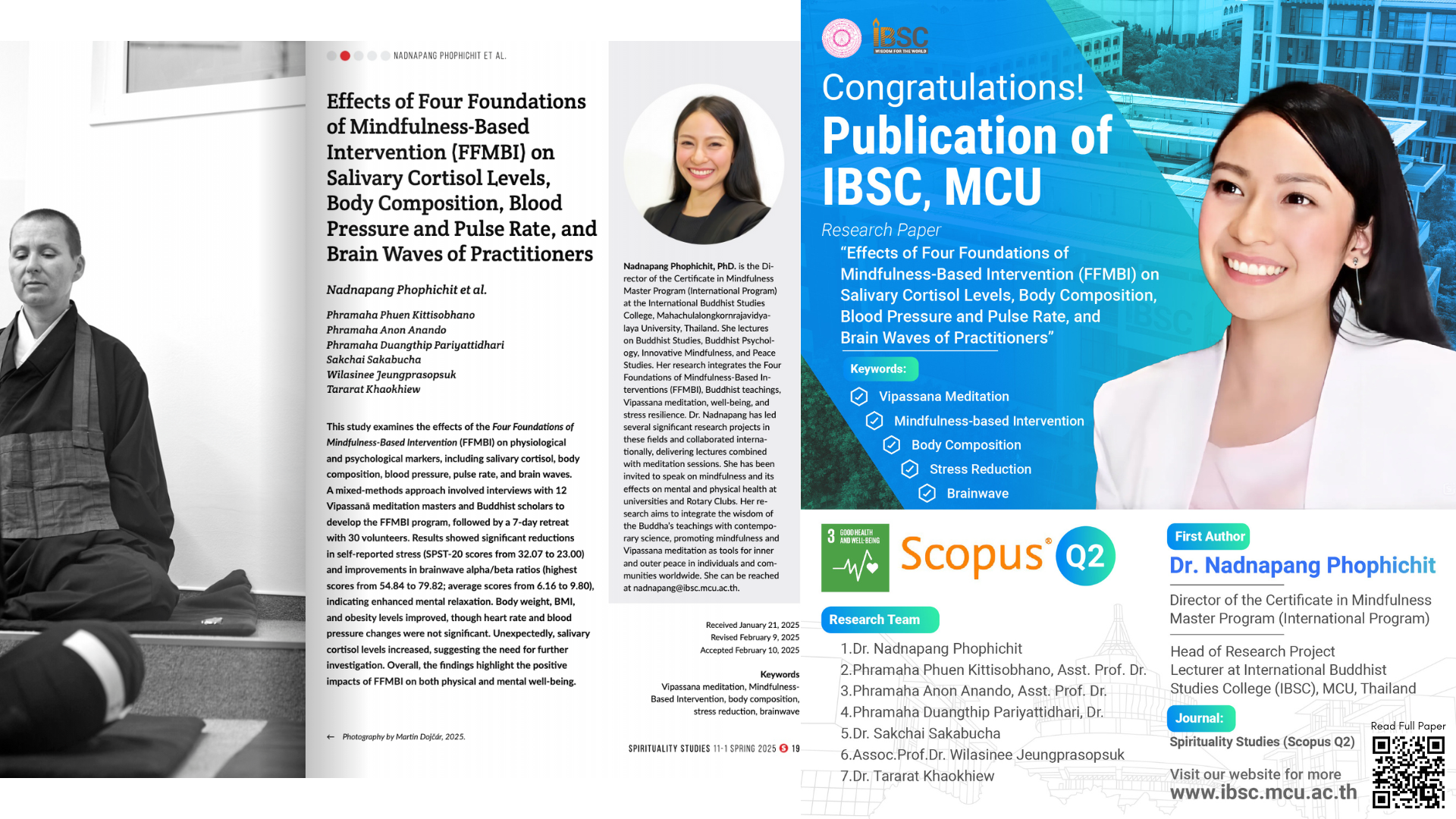
Effects of Four Foundations of Mindfulness-Based Intervention (FFMBI) on salivary cortisol levels, body composition, blood pressure and pulse rate, and brain waves of practitioners
องค์ความรู้
คลิกเพื่อชมคลิป VDO
https://www.tiktok.com/@healthydose.official/video/7537603827885772050?is_from_webapp=1&sender_device=pc&web_id=7543840241569170951
@healthydose.official งานวิจัยคนไทย ผลลัพธ์การนั่งสมาธิที่อธิบายเชิงวิทยาศาสตร์ ต้องขอบคุณอาจารย์ ดร.นาฏนภางค์ โพธิ์ไพจิตร์ ผู้นำร่องนำแนวทางการปฏิบัติธรรมในประเทศไทยจัดงานฝึกสอนให้ชาวต่างชาติ ใครสนใจ อยากทราบรายละเอียดเพิ่มเติมก็ไปเจอกันได้ที่งาน The Foodism Show และ Thailand Health & Wellness Expo วันที่ 18-20 กันยายน 2568 งานแสดงอาหารและสินค้าเพื่อคนรักสุขภาพ เอาใจใส่ Healthy #im#impactเมืองทองธานี#ส#สุขภาพดี#ซิดนีย์sydney#วิทยาศาสตร์ร่างกาย#กรีนสกรีนดีโอ#กรีนสกรีนวิดีโอ
♬ original sound – ซิดนีย์ วิทยาศาสตร์ร่างกาย – ซิดนีย์ วิทยาศาสตร์ร่างกาย
ชื่อผลงานวิจัย (ภาษาไทย) ผลของการปฏิบัติวิปัสสนากรรมฐานตามแนวสติปัฏฐาน ๔ ที่มีต่อระดับคอร์ติซอลในน้ำลาย องค์ประกอบของร่างกาย ความดันโลหิต และอัตราชีพจร และคลื่นสมองของผู้ปฏิบัติธรรม
ชื่อผลงานวิจัย (อังกฤษ) Effects of Four Foundations of Mindfulness-Based Intervention (FFMBI) on salivary cortisol levels, body composition, blood pressure and pulse rate, and brain waves of practitioners
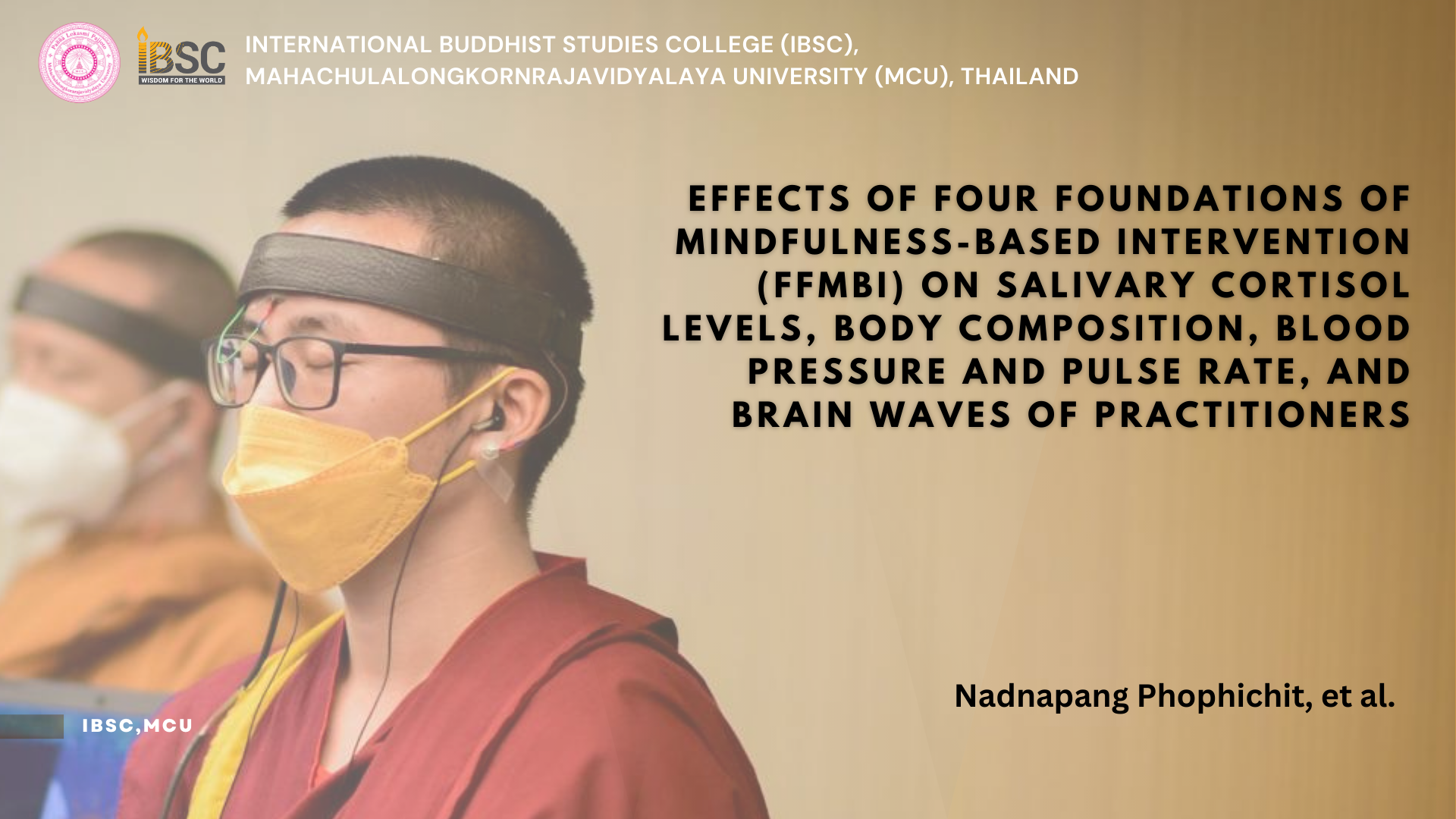
Four Foundations of Mindfulness
The Four Foundations of Mindfulness, or “cattaro satipaṭṭhānā” in Pāli (Buddhaghosa, 2010), are described in the Mahāsatipaṭṭhāna Sutta (MN 10). These four foundations include the mindful contemplation of the body (Kāyānupassanā Satipaṭṭhāna), feelings (Vedanānupassanā Satipaṭṭhāna), states of mind (Cittānupassanā Satipaṭṭhāna), and mind-objects (Dhammānupassanā Satipaṭṭhāna). The practice of these Four Foundations focuses on cultivating awareness of the body, feelings, mind, and mental objects. These teachings were given by the Buddha as the only path to purify oneself, transcend the suffering of existence, and achieve Nibbāna, as stated in the Dīghanikāya (DN 22):
The one and only path, Bhikkhus leading to the purification of beings, to passing far beyond grief and lamentation, to the dying-out of ill and misery, to the attainment of right method, to the realization of Nirvana, is that of the Fourfold Setting up of Mindfulness.
The practice of the Four Foundations of Mindfulness involves observing one’s experiences without judgment, leading to mental clarity to see things as they really are. By understanding how phenomena arise, exist, and cease, one can cultivate wisdom. The Four Foundations deepen one’s awareness of the impermanent nature of existence, aligning with The Universal law of the Three Common Characteristics (Tilakkhana). This principle highlights that things (phenomena) are impermanent and subject to change (Anicca), inherently unsatisfactory (Dukkha), and beyond one’s control (Anattā).
For instance, in the contemplation of the body, practitioners are instructed to observe and be mindful of breathing, abdomen movements, postures, and the body’s impermanence. In the contemplation of feelings, one observes pleasant, unpleasant, or neutral sensations without attachment. The contemplation of the mind involves recognizing various mental states, while the contemplation of mind-objects includes examining the hindrances to meditation and the factors of enlightenment. In Buddhism, this practice aims to cultivate mindfulness and awareness, leading to a deeper understanding of the nature of reality and ultimately, the cessation of suffering.
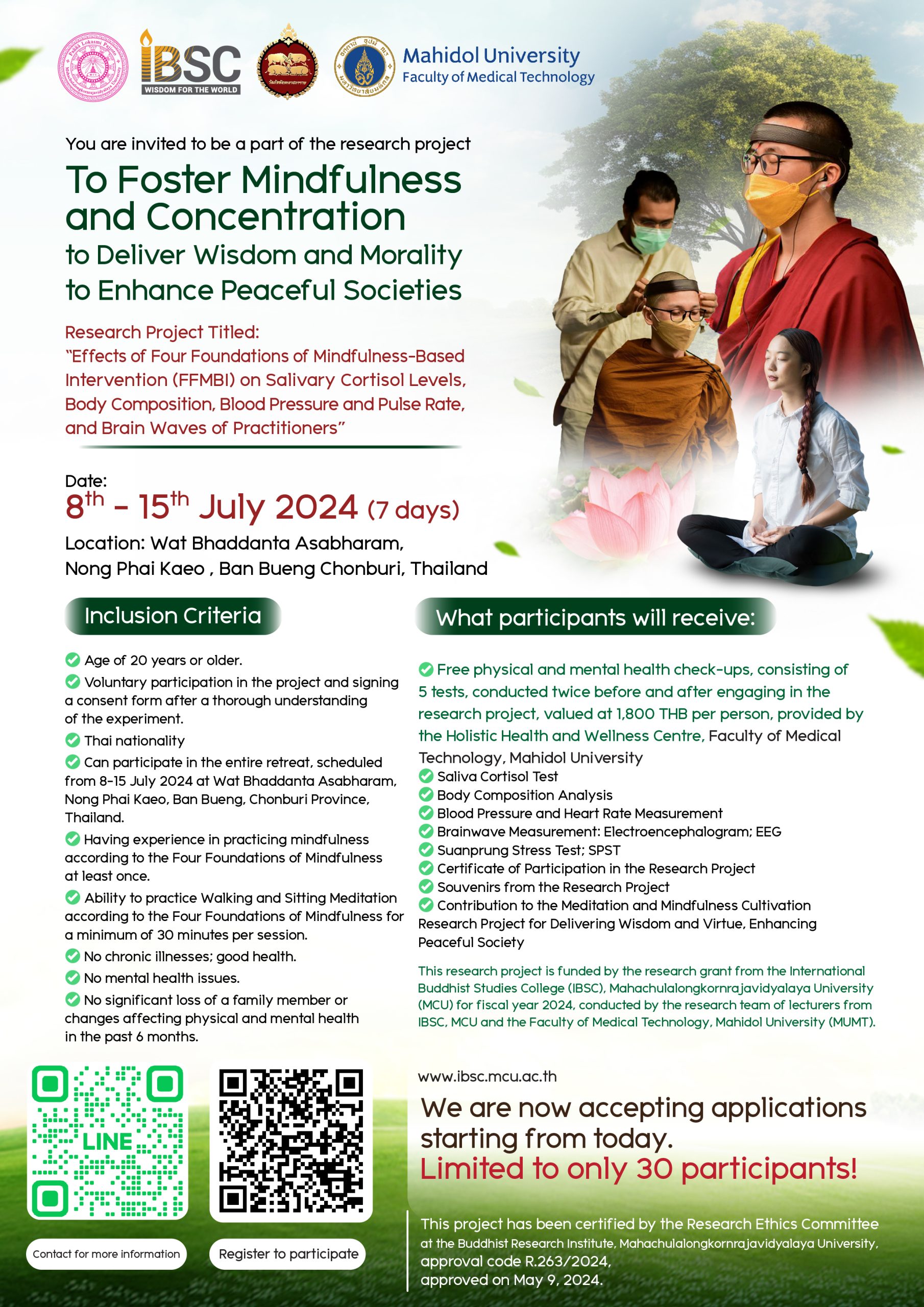
This study investigates the effects of the Four Foundations of Mindfulness-Based Intervention (FFMBI) on various physiological and psychological markers, including salivary cortisol levels, body composition, blood pressure, pulse rate, and brain waves. The research aims to develop and assess FFMBI, a comprehensive mindfulness program grounded in Theravada Buddhist practices. A mixed-methods approach was employed, incorporating both qualitative and quantitative research methodologies. In-depth interviews were conducted with 12 key informants including vipassana meditation masters and Buddhist scholars to develop the FFMBI program. The quantitative component involved an experimental study with 30 volunteer participants who participated in a 7-day meditation retreat. Data were collected before and after the intervention to evaluate physical and mental changes.
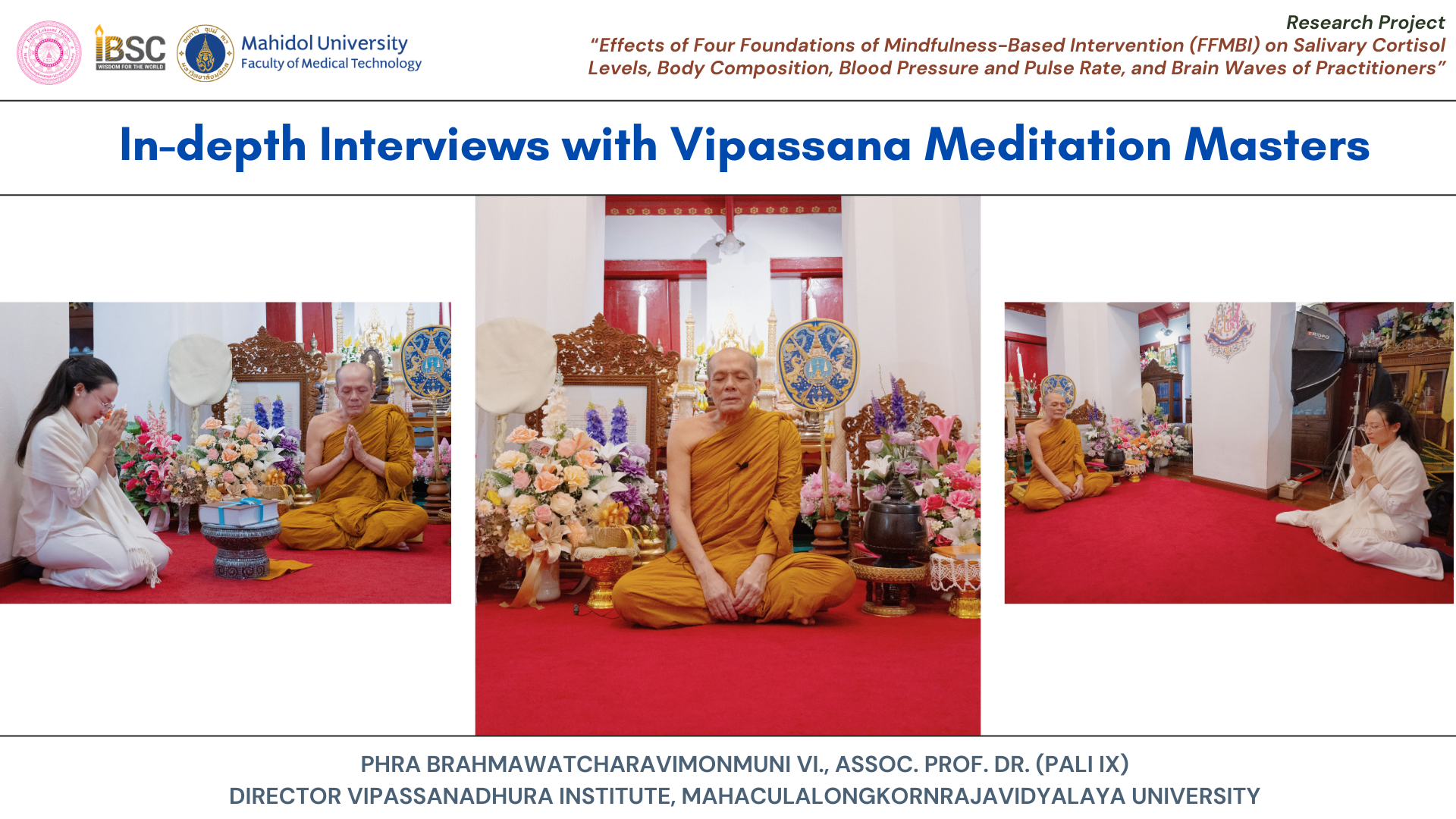
The results demonstrated significant reductions in stress levels, with self-reported stress scores decreasing from 32.07 to 23.00 as measured by the Suanprung Stress Test 20 (SPST). Brainwave analysis through EEG revealed significant improvements in the alpha/beta ratio, both in the highest scores (increased from 54.84 to 79.82) and average scores (increased from 6.16 to 9.80), suggesting enhanced mental relaxation. Body composition changed with a slight decrease in body weight and slight improvement in BMI and degree of obesity, but there were no significant changes were observed in heart rate and blood pressure. Contrary to expectations, salivary cortisol levels increased from 0.106 μg/dL to 0.405 μg/dL (p-value < 0.05), indicating a need for further investigation into the physiological responses to FFMBI. Overall, the findings indicate that FFMBI effectively reduces perceived stress and enhances brainwave patterns associated with mental relaxation. This study provides valuable insights into the holistic effects of FFMBI, contributing to the evidence base supporting their implementation in holistic well-being programs. The significant improvements in both psychological and physiological markers underscore the potential of FFMBI as a non-pharmacological intervention for enhancing overall mental and physical well-being.
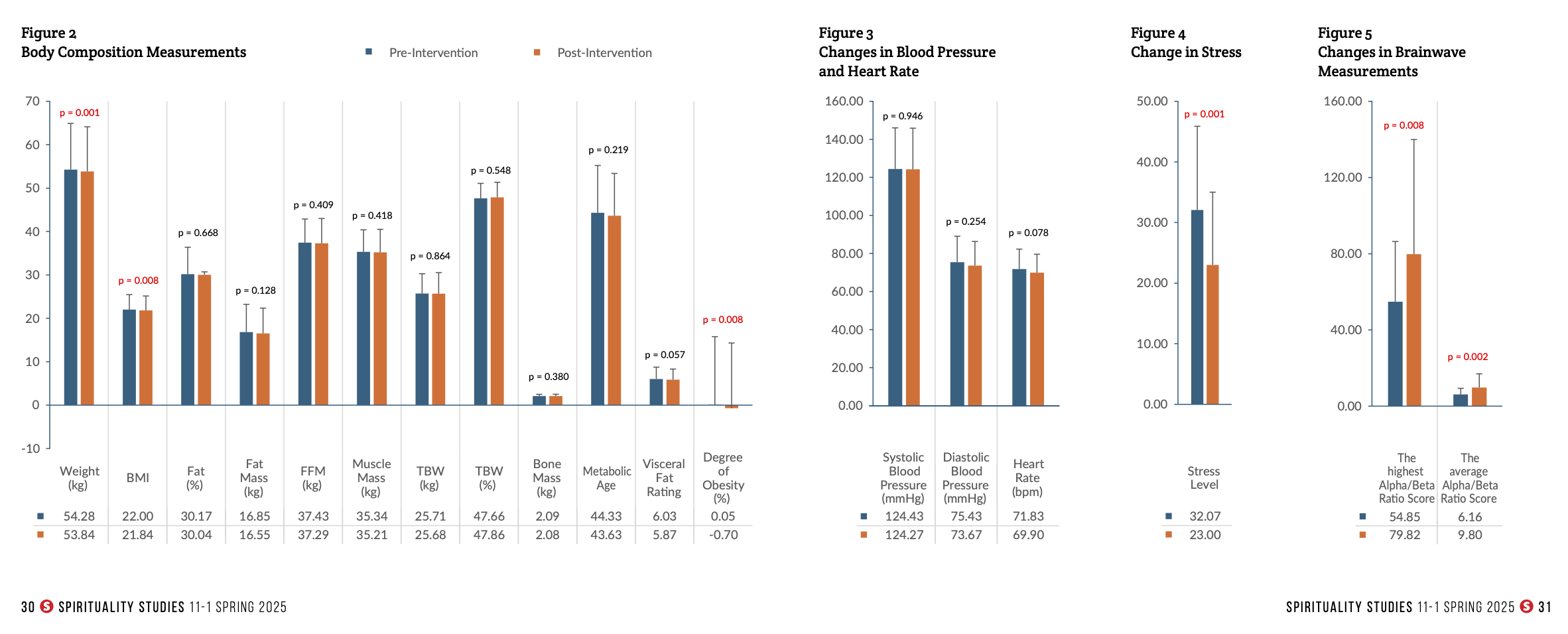
Body Composition Measurements
Following the Four Foundations of Mindfulness-Based Intervention (FFMBI), several changes in body composition were observed.
There was a statistically significant decrease in body weight from 54.28 kg to 53.84 kg (p < 0.05), accompanied by a significant reduction in BMI from 22.00 to 21.84 (p < 0.05). Total body fat percentage showed a slight, non-significant decrease from 30.17% to 30.04% (p = 0.668), while fat mass decreased marginally from 16.85 kg to 16.55 kg (p = 0.128).
Fat-free mass (FFM) and muscle mass showed minor, non-significant decreases. FFM decreased from 37.43 kg to 37.29 kg (p = 0.409), and muscle mass from 35.34 kg to 35.21 kg (p = 0.418). Total body water (TBW) in kilograms decreased slightly from 25.71 kg to 25.68 kg (p = 0.864), while TBW percentage increased marginally from 47.66% to 47.86% (p = 0.548).
Bone mass showed a slight, non-significant decrease from 2.09 kg to 2.08 kg (p = 0.380), and metabolic age decreased from 44.33 to 43.63 years (p = 0.219). The visceral fat rating decreased from 6.03 to 5.87 (p = 0.057). Notably, the degree of obesity showed a significant change, moving from 0.05% to -0.70% (p < 0.05).
Blood Pressure and Heart Rate Measurements
Changes in cardiovascular parameters were observed, though none reached statistical significance. Systolic blood pressure decreased from 124.43 mmHg to 124.27 mmHg (p = 0.946), while diastolic blood pressure decreased from 75.43 mmHg to 73.67 mmHg (p = 0.254). Heart rate showed the most pronounced change, decreasing from 71.83 beats per minute to 69.90 beats per minute (p = 0.078).
Stress Assessment
Participants experienced a substantial and statistically significant reduction in stress levels following the FFMBI. The mean self-assessed stress score, as measured by the Suanprung Stress Test 20 (SPST-20), decreased from 32.07 to 23.00 (p < 0.05). This reduction indicates a marked improvement in perceived stress following the intervention.
Brainwave Measurement
The results of the brainwave measurements demonstrated significant enhancements in both the highest and average alpha/beta ratio scores. The highest alpha/beta ratio score increased substantially from 54.85 to 79.82 (p < 0.05), indicating a marked improvement in relaxation and cognitive state. Additionally, the average alpha/beta ratio score rose from 6.16 to 9.80 (p < 0.05), further corroborating the positive effects of the FFMBI on brain activity related to relaxation and mental calmness.
Cortisol Levels
Contrary to the expected outcome, salivary cortisol levels showed a significant increase from 0.106 μg/dL to 0.405 μg/dL (p < 0.05). It’s important to note that despite this increase, cortisol levels remained within the reference morning range (< 0.69 μg/dL).

This study provides compelling evidence for the multifaceted effects of the Four Foundations of Mindfulness-Based Intervention (FFMBI) on both physiological and psychological parameters. The findings demonstrate significant improvements in perceived stress levels, brainwave patterns associated with relaxation and cognitive function, and certain aspects of body composition. These results suggest that FFMBI has the potential to be an effective tool for stress management, cognitive enhancement, and overall well-being.
The observed reductions in body weight, BMI, and degree of obesity, although modest, indicate that FFMBI may have positive implications for weight management and metabolic health. The significant improvements in brainwave activity, particularly the increased alpha/beta ratios, provide objective evidence of the intervention’s impact on mental states conducive to relaxation and focused attention.
While some findings, such as the increase in cortisol levels, were unexpected and warrant further investigation, they highlight the complex nature of mind-body interventions and the need for more comprehensive, long-term studies. The qualitative feedback from participants further supports the beneficial effects of FFMBI, emphasizing improvements in both physical and mental well-being, and indicating a strong likelihood of continued practice.
However, the limitations of this study, including its short duration and gender imbalance in the sample, underscore the need for more extensive research. Future studies should aim to include larger, more diverse samples over longer periods to better understand the long-term effects and sustainability of FFMBI benefits.
In conclusion, this research contributes valuable insights to the growing body of evidence supporting mindfulness-based interventions. The FFMBI program shows promise as a holistic approach to improving both mental and physical health. As we continue to face increasing stress and health challenges in modern society, interventions like FFMBI may play a crucial role in promoting overall well-being and quality of life. Further research in this area has the potential to refine our understanding of mindfulness practices and their applications in both clinical and non-clinical settings.
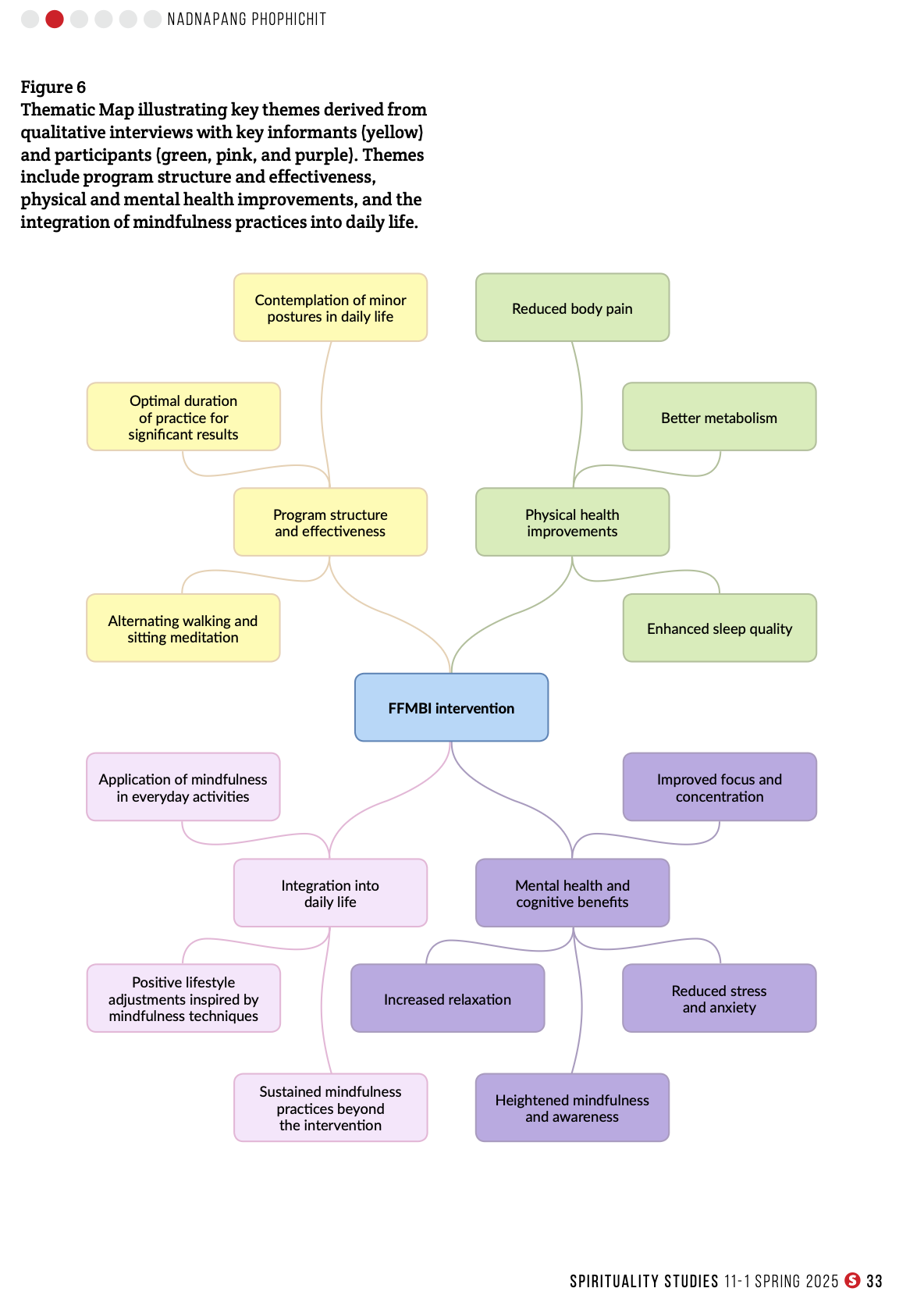

คลิกเพื่อชมคลิป VDO
https://www.tiktok.com/@healthydose.official/video/7537603827885772050?is_from_webapp=1&sender_device=pc&web_id=7543840241569170951
